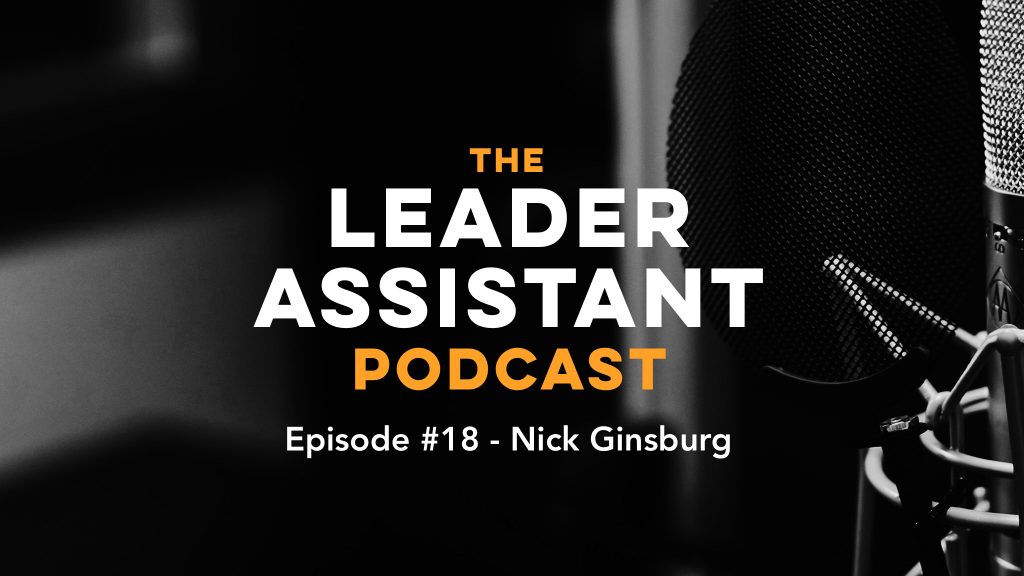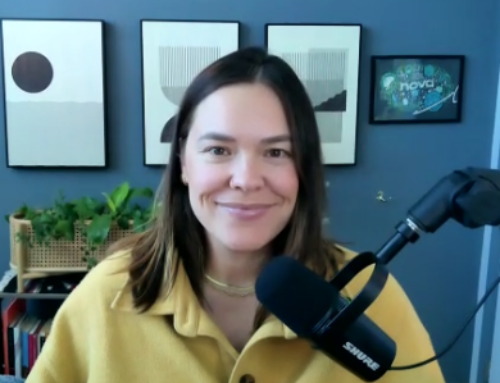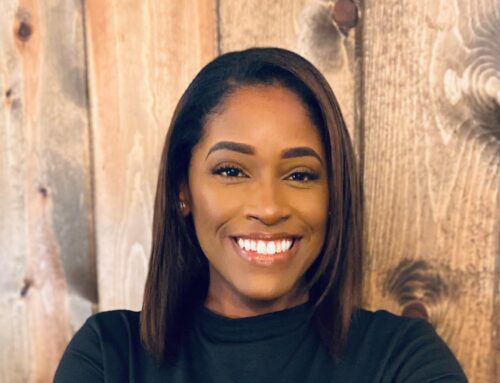This episode of The Leader Assistant Podcast features Nick Ginsburg, who is Executive Assistant to the Provost and Senior VP at Monash University in Melbourne, Australia.
I’ve never met Nick before (he’s in Australia, I’m in Missouri), but he took a risk and “raised his hand” to be a guest on the podcast.
Because we are both EAs, it felt like we’d known each other for a while even though this interview was our first time speaking. Nick had great things to share from his experience so I’m thankful he reached out to share a bit of his story!
What’s the lesson in all this?
Assistants, YOU HAVE A STORY TO TELL, so get out there and tell it!
Speaking of… if YOU would like to be a guest on the podcast, please email me at podcast@leaderassistant.com and we’ll see if we can make it happen!
LEADERSHIP QUOTE
Innovation distinguishes between a leader and a follower.
– Steve Jobs
About Nick Ginsburg
Nick Ginsburg is the Executive Assistant to the Provost and Senior Vice-President at Monash University. In April of 2018, to bring Executive Assistants together to establish a knowledge sharing forum, Nick launched the Monash University Executive Assistant Network to help build a repository of best practices and a sense of community.
He has led key initiatives as part of this network to support the uplift of the capabilities of their EAs through specialized training and development programs, and social networking events.
CONNECT WITH NICK
SUBSCRIBE
Subscribe to The Leader Assistant Podcast so you don’t miss new episodes!
You can find the show on iTunes, Spotify, Google Podcasts, and Stitcher.
Join my email list here if you want to get an email when a new episode goes live.
JOIN THE COMMUNITY
Join the Leader Assistant Facebook Group here for bonus content and to network with other assistants who are committed to becoming leaders!
LEAVE A REVIEW
If you’re enjoying the podcast, please take 2 minutes to rate and review the show on iTunes here. Each review helps me stay motivated to keep the show going!
—
EPISODE TRANSCRIPT
Nick Ginsburg 0:00
Hi, I’m Nick Ginsburg. Today’s leadership quote comes from Steve Jobs. Innovation distinguishes between a leader and a follower.
Podcast Intro 0:12
The Leader Assistant Podcast exists to encourage and challenge assistants to become irreplaceable, Game Changing leader assistance.
Podcast Outro 0:24
Please review on iTunes, you’re listening to Episode 18.
Jeremy Burrows 0:30
Really excited about today’s episode because I posted something on LinkedIn saying, Hey, I’m looking for some stellar EAs to interview for the show. Because I know there are a lot of EAs out there that nobody knows that are rock stars, and really kicking butt and taking names. So Nick Ginsburg reached out to me and said, Yeah, I’d love to chat and be on the show. So we went for it. I’ve never met him. I don’t know much about him other than he’s an EA at Monash University in Melbourne, Australia. So we did an interview. And I’m really encouraged by it because he had a lot of good things to say, a very engaging story to share. And it just reminded me that there are so many people in the world with amazing stories. So please reach out to me if you want to share your story on the podcast, you can email me at podcast at leader assistant.com. And we can set up an interview if it makes sense. So without further ado, here is my interview with Nick Ginsburg in Melbourne, Australia. Hey, everyone. Thanks for listening to The Leader Assistant Podcast. Today I’m joined by Nick Ginsburg, who is executive assistant to the provost and senior vice president at Monash University in Melbourne, Australia. Hi, Nick. How’s it going on that side of the world?
Nick Ginsburg 1:59
Yeah, good Jeremy, how are you?
Jeremy Burrows 2:01
I’m doing okay. Happy Monday. I guess it’s Monday for us. Now, it might not be Monday when people listen to this. But that’s right. Yeah. So Nick, what was your very first job?
Nick Ginsburg 2:13
Oh, wow. So it feels like a lifetime ago. But my very first job was working in retail as really a sort of a sort of jack of all trades in a retail store, which was fantastic. But my probably my first real corporate job was working at one of our local banks. In really, sort of in a customer service area, which is something that I’ve always loved. And it was sort of a real foundation, to sort of my career sort of leading up to now. But yeah, that was it was it was great. But as a sort of 20 year old in a in a bank, it was slightly daunting, but fantastic experience.
Jeremy Burrows 2:59
So you’ve just learned how to wear a tie at that point. Is that right?
Nick Ginsburg 3:05
Yeah, all of the the grown up things that you seem to learn, all happened in that job. So wearing a tie and learning how to speak in meetings and watching your tone. And all of that was all in that first job, which was great.
Jeremy Burrows 3:24
So when and why did you become an EA?
Speaker 1 3:29
Well, it’s actually quite a funny story for me. So I’ve been in banking for a while. Very much customer service, supporting home lenders, so really providing funnily enough EA type duties, to the home lenders, and moved to moved from Queensland, down to Victoria, so down to Melbourne and decided that I wanted to change industries and get into higher education. And when that happened, I knew the best thing that I could do would be to transfer into a finance role at the university because I knew I could get in that way. And once I got there, I really wanted to stop and think about what I wanted to do with my career. And I remember really vividly about maybe three, four months in I was watching the EAs, run these meetings and organize their bosses lives, sort of on the next level up in the building that I was in, and I went that’s what I want, that has everything in it that I want. I’m love organized thing, love customer service, love problem solving. I’m in Give it to me. But I knew jumping from finance to there was just not going to happen. So I really looked at what was the best path I could take at the university to get me into that role. And that really was through HR. So I was actually in HR for a couple of years to get a really broad understanding of the university And then about four years ago now, a role opened up supporting three executives in our central administration area. So there was three, Vice President boss. And that was my first real officially titled EA role. But the EA skills were so strong throughout all my other previous roles that it was obviously destined that I was going to end up in this field.
Jeremy Burrows 5:30
So what do you love about your role as an EA?
Speaker 1 5:35
Pretty much everything. I’m not. I’m not someone that gets sort of down and out on anything to do with the role. But really, for me, the key things are absolutely customer service. Problem solving those two really the things that I love, so I love playing diary, Tetris love figuring out what I can squeeze, where what I can shorten, if an emergency happens, I’m not someone that panics, I love it. I’m happy to jump in and try and fix it. But really, on top of that, being an EA, and kind of having your own office to run has allowed me to really find efficiencies and areas of productivity to really push in the EA space and find better ways of doing things. So all of those things combined. Never have a like I have the odd bad day. I mean, Let’s not lie, but love it. Great role.
Jeremy Burrows 6:46
So what’s something you don’t like about it?
Speaker 1 6:51
That’s that’s a little harder to answer for me. I don’t love particularly in the higher education sector. And I’m sure it happens in other industries, no doubt, but there is quite a hierarchy in terms of other EAs within the area, so I don’t necessarily love that I’m not someone that that particularly likes to remind people where I sit in an organizational structure that doesn’t, I think, benefit anyone. So that’s probably the thing and that gets, that sometimes gets brought up in ways of how people deal with you and organize meetings and stuff like that. That’s the thing that I don’t particularly love, but that’s changing quite rapidly, particularly at Monash. So that’s great.
Jeremy Burrows 7:47
Do you have any crazy stories from your career as an assistant? Or maybe some something where you saved the day? Or maybe both?
Speaker 1 7:59
Not I don’t have any sort of traditional crazy stories. I mean, you hear these urban sort of legends of EAs having these crazy stories? I don’t have one yet. And I’m sure it’s to come. Perhaps, for me, there been a couple of times. And I think as EAs we tend to save the day, more times than not in various ways. But absolutely, there have been times where what someone in our team, and it’s happened to all of us where we’ve missed something. And I’ve had to get my boss to a meeting sort of 45 minutes away by car in 20 minutes. Now, we don’t have the Jetsons technology yet I can’t put him in one of those air vac tubes to get in there.
Jeremy Burrows 9:00
Even with all, even with all your experience and banking, you can’t figure that out. Right?
Nick Ginsburg 9:05
I know. I know. I just need to figure out a way of shrinking him down to put him in one of those those tubes to get in there. But I don’t I don’t think that’s that’s quite there yet. But there’s been moments like that where we’ve had to hurry and cancel meetings and juggle things in and get him off in a way. And I mean, recent I mean things happen in personal lives where where people need to go because of family members that are unwell. My boss is actually from America. So we’ve had an instance where we’ve had to get him over there relatively fast and sort of in 20 minutes, I’d organized him a flight three hours later, to get him from Melbourne to Ethica. And that was probably my proudest moment in the last few months. Getting him there as fast as I possibly could, without any travel agency advice, nothing like that it was just me my best friend Google. And away we went. So, yeah, that’d be probably the best one. Yeah.
Jeremy Burrows 10:12
Nice. So I’m gonna throw you a curveball. So we connected on LinkedIn. And not even that long ago. I don’t think not. I believe you responded to a post where I said, Hey, I’m looking for some, some people be on the show. Why? Why did you want to be on the on this podcast?
Speaker 1 10:33
Well, I think what you’re doing with the podcast, and obviously not saying it to you, because you’re here. It’s really phenomenal. I think anything that brings EAs together is a benefit and such a plus. So I think all of us have a really individual story. So you could have three people that have done the exact same EA role with the sandbox, and their stories are going to be completely different. So I think the more EAs can share their story of how they got to where they are, what they do, what they love, what they don’t love, things that they found. That’s, I mean, a winner. So absolutely, I wanted to jump as soon as there was any kind of inkling that that I could get, I could get on the podcast, of course, happy to share my story. And I think the more EAs that do it the better.
Jeremy Burrows 11:29
That’s great answer, Nick, I know threw you a curveball, but you hit a homerun on that one. If you could snap your fingers and instantly give all assistants in the world more of something, what would it be?
Nick Ginsburg 11:45
My My gut instinct is time. But I think that’s cliche answer. So I think if if, if every EA could have the ability to analyze their work, and how they do it to find efficiencies. That would be my number one. And I think not everyone has that that sort of that brain to be able to look at what they’re doing and figure out a better way, I definitely don’t have the best reign for that. But I’m constantly trying to learn. But I think if everyone was just able to look at something and go, No, I can definitely do that. 20 times better than that would be amazing. Imagine how fast we’d all be? Yeah. It’d just be nonstop. So that’d be
Jeremy Burrows 12:38
great. So what’s your best tip for managing constant interruptions?
Nick Ginsburg 12:48
So for me, I break my day up. So I have a look at my managers diary the day before, obviously, we’re looking at it 24/7 For weeks, but really I sit down and hone in on his diary that night before? And I think right? When am I going to have the least amount of interruptions, we’re always going to be interrupted. But where is that? Where are the gaps? Where am I going to be able to sit there and really hammer away some important work. And that’s what I focus on. So for me, my boss and I, early people are early people. So we both get into work before 730. So he gets in at about 645 in the morning, I’m at work at 730 The latest. And that time in the morning is for us. And then once he’s meeting start at nine o’clock I look at when I’m going to be able to find time to really sort of lock myself away. And when I say lock myself, I don’t mean in an office just kind of focus on that work. And I know that I’m not going to get as many interruptions as if, say big meeting was about to start or whatnot. So really finding those those sweet spots in the diary where you can where you know that you can get a good 45 minutes done without anyone bothering you.
Jeremy Burrows 14:10
Yeah. Great, great tip. What do you wish executives would do differently when working with their assistants?
Nick Ginsburg 14:21
Well, that’s a really good one. I’m really lucky with my boss, so he trusts me 100% and has handed over a lot of stuff to me. That hasn’t happened in the past. I think if executives can have that trust and really give their assistants the ability to be autonomous. It’s such a great relationship then. So I think if they in most execs are like this, but they still do that that aren’t as trusting. And that’s okay. But if if the world in general, but mainly the execs could get a bit more trusting, I think that it really changed things.
Jeremy Burrows 15:12
So do you manage your executives, email? Do you reply on their behalf? And are you in their inbox?
Nick Ginsburg 15:21
Yeah, yeah. So I, I manage his diary, of course, all incoming messages, and I deal with his inbox. I write back to some, but I often will draft responses for most and really work with him on what needs to be done, and then I’ll take ownership over those.
Jeremy Burrows 15:48
Yeah. Is there anything you would recommend to an assistant who has a boss that is very hesitant to let them into their inbox? What how would you encourage them to try to get in that situation?
Speaker 1 16:04
Yeah, I have had that before. And I just said that my boss is amazing and has trusted me 100%. But I’m the first EA, that he has allowed access to his inbox. So I was I was the first person to really get in to that, which is amazing. And I’m forever grateful. But I sat down with him in the beginning. And I showed him how I work with my, my then previous, or my then current bathroom and our previous boss. This is what I do. This is how I manage the inbox. This is why it’s easier for you. And once I showed him, really how it can work, and what it means for him in terms of his time, being able to be spent on other things. That was an instant win. So I really think for other EAs, it’s really important to show the benefits. Don’t go in and say that it makes your job easier. And when I say your job, I mean the EAs role easier, because that doesn’t, then they’re not going to really worry about that. It’s really about what’s in it for the executive. So if they know that by you being in their inbox, they get an additional hour a day that they can do anything. Yeah, it’s tough to find any an executive that would say, No, thank you. I think once you really kind of show them that you can be saving them time. I mean, I do things in my boss’s inbox, I’m marking stuff as urgent marking stuff that I’ve actioned so that when he opened up his inbox, he goes right only need to do these 20 emails next, got the rest. That’s instantly saving that time. Yeah. It’s awesome.
Jeremy Burrows 17:57
So what should executives look for In an assistant?
Speaker 1 18:02
I absolutely think that anyone that is recruiting for an EA, you want someone that is at that is tech savvy, that is really interested in learning new things, and understanding how the business works, and has that drive. Because there are plenty of people out there. And I’m not just meaning EAs that just love turning up to their job and part of punching away the keyboard, and then go bad if you want someone that’s really truly sort of part of your business. It needs to be that kind of driven person.
Jeremy Burrows 18:46
So let’s talk about your biggest mistake you’ve made as an assistant and what you learned from the experience.
Nick Ginsburg 18:56
Okay, so I will, there’s a disclaimer to this. I pride myself on my speed at work. So being able to process things as fast as possible without losing that attention to detail is having mistakes. So I had been working for my manager for about six months. And he meets with his manager, which is our Vice Chancellor and President weekly, and so I do up his agenda. He approves it, I send it to the Vice Chancellor and that’s all good. What I did was accidentally we’ve all done it, I’m sure to a varying degree, hit send as I watched the email disappear to the wrong email list. And so I’d sent his agenda which is very confidential out to a group of people that should not have seen it. I have never been more mortified. And I don’t particularly love making mistakes. And so I once I sort of regained my composure and started breathing again, I got up went straight into my boss’s room and said, This is what’s just happened. I’ve emailed them to recall the the message, but you need to know. And I’m so sorry. It won’t happen again. He was very, very, very nice about it told me not to worry, it’s all fine. There was nothing that bad on it anyways, which made me feel better. But it really honed in that. Yes, speed is good. But I need to stop and really think and double check. Before I hit send, because you, you get into this rhythm, where you’re, where you’re hitting, send, and going and going and going and going going, that you aren’t really paying full attention if you’re in that sort of fast zone of sending those emails. And so it really made me since then, stop and go, right. I’ve got this attachment. This is the body, this is a subject. That’s the right person in the To field. I’m hitting send. So it really forced me to slow down to go, Hey, what am I doing? Because you can’t you can make that mistake once, maybe twice. But if you make that mistake all the time, it’s not not good. It wasn’t good the first time I still feel sick thinking about it.
Jeremy Burrows 21:34
Yeah, I’ve been saved by the Gmail Undo Send option.
Speaker 1 21:39
Yes. Yes. Which I turned on, swiftly after that happened and, and bumped it out to the maximum time as well. So that’s, that’s, I haven’t had to use it yet. Which is good. But no, that is a bit of a godsend.
Jeremy Burrows 21:57
I was gonna say I use it probably once a week or a few times.
Nick Ginsburg 22:01
But now I’m now I’m insanely paranoid about where my emails are going. So I haven’t used it yet. But I’m sure the time will come.
Jeremy Burrows 22:11
Do you? Can you think of an example of something that you’ve seen either your boss or another executive do really, really well when they’re working with their assistant?
Speaker 1 22:23
Yeah, absolutely. There’s a lot of examples. So in the Chancellor building where we are now, our Deputy Vice Chancellor enterprise, who you would hope is at the forefront of these things. But him and his executive assistant, they use Trello boards, like I’ve never seen. They’re both in Trello boards, there things are moving and things are live. And they’re happening all the time. And it’s phenomenal. And as soon as you see that, you go, Okay, I need to be doing something like that. But yeah, it’s that sort of having the two roles really combined and overlap, I think is so key. And I think they’ve done that with the Trello board. There’s a constant flow of information. Fantastic.
Jeremy Burrows 23:18
So if someone told you they’re considering becoming an executive assistant, what would you tell them?
Nick Ginsburg 23:25
So I understand it. So I have a standard line that I say sort of say to people that if you think that it is sitting down answering the phone and getting tea and coffee, and that views, then it’s not the role for you. That EA role has changed so much. And in Australia, so much even over the last five years. It’s gone from quite traditional to now very much an influencer within the business. So I say to people, if you if you want to be involved in the decisions, and really help your your executive, change the world, which is what I want to do, I want to be supporting an executive that is that is literally changing the world. And so if that’s what you want, and you want to be in that, and you love problem solving, then then go for it and start building networks and introducing yourself to people really make it clear as to why you’re wanting to make a career change. And the opportunity will open up eventually.
Jeremy Burrows 24:35
So what’s a productivity hack that you can’t live without? You already mentioned the time blocks and kind of like focus.
Nick Ginsburg 24:42
Yeah.
Jeremy Burrows 24:42
finding focus time, what’s something else that you’ve found that helps your productivity?
Nick Ginsburg 24:48
So about 12 months ago, so I’ve always been relatively paperless. I don’t, I don’t particularly like printing paper both from a sustainability point of view. And also I find paper on my desk quite annoying and stressful. So,
Jeremy Burrows 25:03
so you can relate to my, you can relate to my podcast episode where I said paper is awful, but still useful.
Nick Ginsburg 25:13
Yeah, 100%. And so And funnily enough, my boss is entirely paper based. So and that’s, that’s fine. I don’t need to be paper based. So he can get everything paper and I’m happy to print for him, but to me, and how I manage my role has to be paperless. So about 12 months ago, went paperless, got a new iPad, everything is taken down on the iPad handwrite handwritten notes. But really moving paperless. And having sort of that true mobility in your role has almost freed up enough time for me to actually stop and evaluate what else can change. So it’s given me that ability to really go, okay, that actually freed up a chunk of my time. Now, what else can I do? And that was phenomenal. So really taking that paper away, using the app. So I use monday.com as my, my To Do lists in my tracker, and I’ve got working with me a team of EAs that support the Vice Provost that report into my boss, and we’re all on monday.com, we have clear visibility of what each other’s doing. So the phone calls have cut in half. We’re not calling each other with little questions, we can see where something’s at. So little things like that, which add up a huge, so really taking that that leap into being paperless having everything online in a cloud, where you don’t need to be sort of chained to your desk, from 7am to 6pm. But that’s not what needs to happen anymore.
Jeremy Burrows 27:03
Yeah, I like the way you said about the cloud. I am very adamant that everyone should have devices where if you dropped in the toilet, or if you dropped him in the lake, you’re you’re you could just get another one and get right back to it. 100% Everything should be backed up.
Nick Ginsburg 27:23
Yeah.
Jeremy Burrows 27:24
On the cloud.
Nick Ginsburg 27:24
Yeah, absolutely. And, and I have been caught out before. Particularly with my work laptop where a few years back, I’d lost a bunch of important documents. At the moment that happened, I went I’m never doing that again. So I save everything in in Google Drive. I’ve got 10 drives, and everything is in the cloud. Everything. You just can’t I don’t think you can live any other way now. Too scary. Exactly. Yeah.
Jeremy Burrows 27:59
What’s, what’s one thing you wish you knew more about?
Nick Ginsburg 28:05
There’s a lot I wish I knew more about, I’m not the person that will ever say I’m amazing. And I know everything that’s never going to come out of my mouth. Because I’m I don’t.
For me. We work really heavily as a university, in research in the research world. And I know that there’s stuff that’s being done at the moment at the university, that would help my role.
If I could just connect with the right people, and we’re a very large university. So it’s often quite hard finding that right, one person to chat to. But we’re starting to get into the AI space at the university now, which is great. But I wish I knew more on that stuff. So that’s what I’ve really been kind of honed in and learning and not being afraid like I listened to the podcast that you did, or the webinar sorry, a few days ago last week with Base on AI and that. I mean, even from that podcast, you go, Oh my God, there’s so much that I can do. So really learning into that, that that space is probably my number one. Sort of, of what I’m focusing on now.
Jeremy Burrows 29:33
That’s a good I think that’s a good choice. Yeah, good.
Nick Ginsburg 29:37
Well there’s so
Jeremy Burrows 29:38
worth your time to look figure out that stuff.
Nick Ginsburg 29:41
Yeah, I mean, there’s so much that can be done in it. I mean, even I’ve just downloaded Google Assistant last week, which I’m very slow. Clearly on that on that boat, but amazing. I’ve been using it nonstop. And even that’s helped. So I really want to learn more in the AI space? Because I think AI, I think we’re incredibly lucky as EAs because I think AI is really going to help us be so much better at our jobs.
Jeremy Burrows 30:14
I agree. What’s what makes an assistant a leader?
Nick Ginsburg 30:20
Definitely standing out and sharing your story with out being worried. So I don’t I think of myself sometimes as a leader, but there’s a bunch of EA leaders in my, in my workplace. And I think the more EAs share their tips, their hacks, what, what what works for them, what doesn’t all of that stuff, and their journey, I think that makes them a leader to other EAs. I think in terms of a leader within the business, really understanding your role in the organization, and not as someone that is just an assistant, there is so much more to the job, where you can really be involved in the running of the business and be helped help sort of put in place the mechanisms to have a decision that will literally change the world. And if you’re in that, and you’re showing the rest of your company that that’s what you can do. Then you’re instantly a leader. It’s all about putting yourself out there. And sharing and being knowledgeable.
Jeremy Burrows 31:41
I love it. Well, Nick, I really, really appreciate you taking time out of your day to talk with us. And I think it’s just still amazing with technology that we can, you can be in Melbourne, Australia. I’m in St. Louis, Missouri. And we’re just having a chat and that people literally from the rest of the world are going to listen to this episode for years and years to come. And so I just props to you for sticking your head out and reaching out and taking a taking a risk and being vulnerable and put yourself out there. And yeah, how can we how can my listeners find you online and support what you’re up to?
Nick Ginsburg 32:24
Yeah, absolutely. So I’m on LinkedIn, as I think everybody should be. So you can find me on LinkedIn. If you just search for Nick Ginsburg, you’ll see my, my dorky face on there. And on Twitter as well. I have grown to love Twitter recently in the last sort of 12 months. But I’m at Nick_Ginsburg. So come and come and join me.
Jeremy Burrows 32:54
Awesome. We’ll all share those links on the show notes so people can get to those easily. But yeah, thanks again. And we will hopefully talk to you soon and hopefully meet in person someday. I’m excited to come to Australia Sunday. I don’t have it planned yet, but I’m very excited to get that way.
Nick Ginsburg 33:10
Yeah, absolutely. Thanks for having me.
Jeremy Burrows 33:13
All right. Have a good one, man.
Nick Ginsburg 33:15
Thanks, you too.
Jeremy Burrows 33:15
Thanks for tuning in to my conversation with Nick. Please check out the show notes at leaderassistantcom/18. And don’t forget to join our Facebook community at Facebook.leaderassistant.com. And lastly, be sure to sign up for email updates at my website at goburrows.com forward slash sign up where I share tips tricks, resources, online course announcements, event announcements and more.
Podcast Outro 34:01
My dad out and leave a review on iTunes. Go bulls.com







